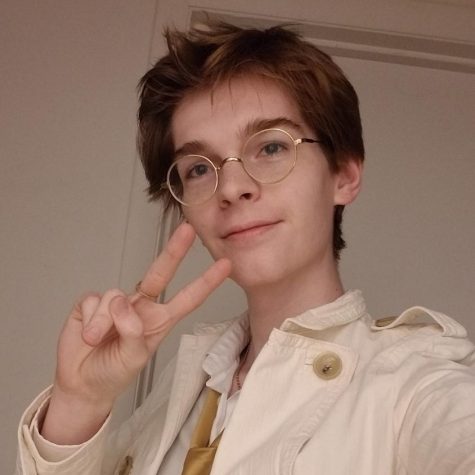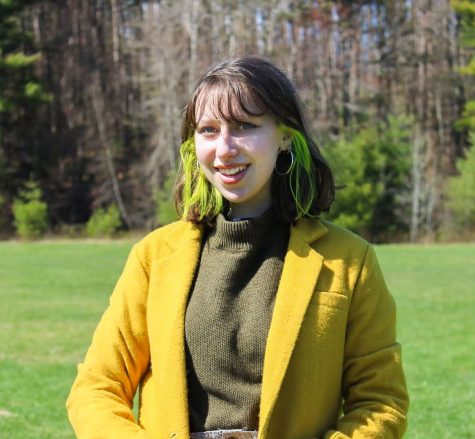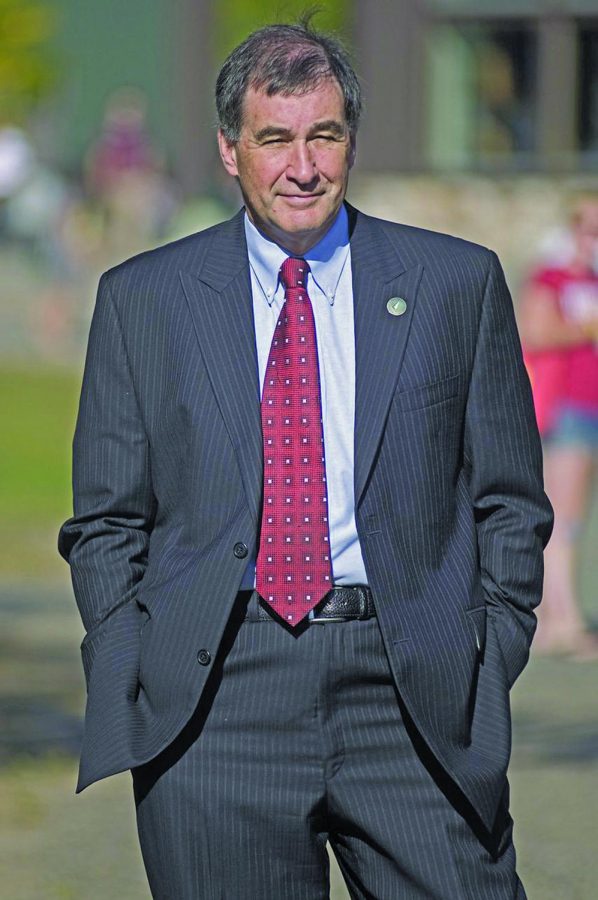President Mills’ first semester
Interim President John Mills
As Northern Vermont University is increasingly aware, changes can be difficult, but they can also be rewarding. President John Mills has seen his first semester with our school go remarkably the same — difficult but rewarding.
A new environment
“I spent my entire career in private higher education, and public, state-run higher education is a completely different animal, with different checks and balances,” Mills described this as one of his greatest learning experiences in addition to finding out about NVU’s own culture and history. He said many of the systems in place are there for statutory purposes or sometimes tradition.
“My overall experience has been … when I see things that could be better or more efficient, to make sure that we can try and implement those things without creating too much turmoil or going against state regulations,” Mills said.
Presence in unification
“I came on board late,” Mills said. “The transformation effort started last spring, and I wasn’t fully engaged until the end of August. … The catch up has been a challenge for me, because there’s a lot of historical and cultural things you just have to learn about.”
Mills said his role in transformation is like that of a gatekeeper — he and the presidents of the VSCS’s other institutions, along with members from the chancellor’s office, will review work done between stages of development. Currently, Mills said this kind of work is becoming increasingly prevalent for him as the system moves from the discovery phase into design.
“The amount of work is incredible, what these people have done and the commitment that’s been made by the faculty and staff,” Mills said. He commended the efforts of NVU’s faculty in optimization work, but said he felt it would be important to get input from the broader community as we move further along in the process.
A focus on outreach
Rebuilding a healthy connection with the communities around our institutions is Mills’ primary concern as interim president. He said because he won’t be present when Vermont State University launches, his goal is to rebuild support and belief in NVU as it transforms into VSU.
“That’s why I went out into the community, going to the all the school districts, going to the service organizations,” Mills said. He noted that he has joined both the Lamoille Economic Development Corporation and the Northeast Kingdom Economic Development Initiative, “to really become the spokesperson for NVU having a say and having a part in the economic development and growth in this region.
“My argument wherever I’ve been is, ‘it does no good to raise NVU’s boat if all the boats around us don’t rise with us,’” Mills said. “Same thing if we have groups that are being successful: we need to find out why they’re successful and see if we can help and join in that success.”
Mills said he had a few main focuses when promoting NVU to the nearby communities. He has stressed the commitment by the Vermont State Legislature and VSCS chancellor’s office to keep its campuses open, as well as the upcoming merger bringing additional opportunities to new students.
“When I stepped outside the walls of Lyndon and Johnson, I found out that the people out there want us to be successful, and they want to participate,” Mills said. “That’s just been encouraging for the future, and we’re getting more and more interest and more and more outreach from groups that want to partner with [NVU].”
The Learning Working Community
Mills has been promoting NVU’s budding Learning Working Community, a program that aims to connect students with local businesses and organizations to provide on-the-job applied learning opportunities with benefits of both payment and school credit.
Mills said one main responsibility in promoting the program is to “make sure that these businesses, industries [and] not-for-profits know that for us to succeed, our students need access to their training. … That type of experience can only be accomplished in the community by their partnering with [NVU].”
These partnerships are beneficial not only to students, who can earn both wages and school credit, but also to the businesses who take on these young learners as cost-effective sources of labor. In addition, the potential for students to be hired full-time after they graduate is a bonus to both ends of the exchange.
As part of expanding the program’s reach and functionality, Mills said it was the primary feature of his community discussions this semester. “It’s called the president’s round-table: we invite legislators and major donors and significant alums and community members to come and hear what we’re doing,” he said.
Overall, Mills said response from the community has been positive, and multiple entities have expressed interest in participating. He said NVU’s Coordinator of Partner Engagement and Workforce Development, Vin Favoroso, “is working with the banks to get more access for students to get involved in the skills and experience in the banking industry.”
Mills cited these recent discussions with banks as an example of the Learning Working Community benefiting both students and the businesses involved. With the worker shortage across the country, banks are being hit especially hard, and many in Vermont are looking for young, trainable hires.
Mills said that though many students don’t consider working at banks, “the profession is extremely lucrative and very, very steadfast; banks aren’t going away. … So, when you talk about [job] security and great professional opportunities, the banking industry is one of them.”
Increasing enrollment
Mills said aside from forming connections with local businesses and non-profits, another primary part of his work this semester has been reaching out to Vermont high schools to encourage new students to enroll at NVU.
He’s started with some of the largest feeder schools to the university in order to reestablish existing connections and reassure students and teachers that NVU is here to stay, even if it will soon be under a different name. Mills also intends to travel to other schools in Vermont as well as nearby states like New York and New Hampshire.
“Literally, it’s from the Connecticut River to the shores of Lake Champlain where I’ve been traveling,” Mills said, “and I’ve only gotten, I think 10 to 12 done; I’ve got over 30 that I want to visit.”
Mills said this will continue to be one of his largest projects as we move into the spring semester. In addition to drawing more students to apply, he said the high schools have expressed interest in getting NVU’s community more involved with their students.
“Ancillary to that has been, we’ve learned the things that the schools want to do, so now I want to make sure that we promote those programs.” Mills said getting NVU students to visit feeder high schools will play a huge part in getting new students to apply and attend the university.
Increasing enrollment has been a major concern of Mills’, and he and his team have been working hard to achieve it. “We have our — as I call them — road warriors, who go to the schools and talk to the students and make presentations and fairs,” Mills said. He added that in addition to marketing NVU to students, “we really needed also to reach the administrators and tell them what we were doing.”
The executive team
Doing this work alone would be tantamount to impossible, and Mills said he has been greatly assisted by members of his team. In the field of recruitment, Mills noted Interim Dean of Enrollment Victoria Dutcher and Director of Marketing and Communications Sylvia Plumb as essential.
“Victoria is relatively new, along with me, but of course — enrollment, enrollment, enrollment — that’s what the game is about,” Mills said. “It’s a constant discussion of what we can do. That’s how I started these visits: talking to her and seeing, how can we benefit our enrollment programs.”
Other members of his team include Provost Nolan Atkins, Dean of Students Jonathan Davis, Associate Dean of Academic Programs Tom Anderson, and Interim Academic Dean Les Kanat.
“Nolan … is critical for the educational mission,” Mills said. “He was here for the NVU unification, so he’s a tremendous source of knowledge and advice for me moving forward. The same thing for Jonathan Davis, who’s been here for so long and involved in that merger — that’s been great.”
Mills said Tom Anderson has been a source of curriculum ideas, especially for targeting students in high school. He added that Les Kanat has been “involved with faculty development … and how we can get our faculty engaged more in their own learning process, which they want to do. We just need to promote it more and get more of our resources dedicated to that.”
Meeting with students
Mills said that in his first semester, he’s been less connected with NVU’s student body than he would like to be. “That’s partially my fault,” he said. “That’s not a student fault.” He noted that because his outreach responsibilities necessitate heavy amounts of traveling, making it to every student meeting can be difficult.
Mills tries to attend as many athletic events as he can as well to help build a connection with students at each school. In addition, He said he met with the Coalition of Minority Students while they were creating their anti-racism pledge and was gratified with their work and its approval by the Board of Trustees.
Mills said that he has attended a few of Lyndon’s student government meetings, but he has been unable to make it to one at Johnson, though he’s communicating with the campus’s SGA to coordinate a visit.
“I want to meet with [students], but I’m not going to impose myself on them,” Mills said. “If they don’t want me, then my imposing isn’t going to help. But if they are interested in having me come by, I will certainly do that.”
Mills is open to meeting with students one-on-one, but requests they schedule a meeting with him through Kathy Armstrong and give him an agenda item so he can come to the meeting more fully prepared.
The goal of this, Mills said, is “so the student doesn’t waste their time, walk in and say, ‘hi, I wanted to talk to you about XY and Z,’ and I would proudly have to say, ‘I know nothing about that. I’ll have to check and have you come back again.’”
However, Mills said he would also take meetings with students for more casual and less structured purposes, just so students can get to know him. “It can be as superficial as, ‘well, I just want to meet you because my name is Mills too,’ or something like that,” he said.
The message being sent
Mills said that in his outreach efforts, he draws a great deal from the contents of Act 74. “The message is that we’ve got to be affordable, accessible, and we’ve got to be engaged with the Vermont community,” he said.
Mills is stressing VSU’s future as providing not only associate and bachelor degrees but also certificates and licenses. He’s also communicating with the Legislature to address the inadequate funding which the VSCS has been receiving.
In a time of uncertainty and change, Mills said, “the acceptance by both communities has been very, very heartwarming.” He praised NVU’s campuses for their dedication to making sure that it’s not just NVU which will succeed, but the Vermont State University it will soon be a part of.
“We know there’s some controversy out there about this from other sectors of the VSU system,” he said, “but right now, these two institutions are really, they’re carrying the water and they’re doing a great job to make this a success.”

Senior, Creative Writing
From Fletcher, VT
Spring 2020-Present
"Call me mommy and I'll bring you blankets and hold you while you cry."

First year
Commuter, from Underhill VT
Fall 2021-Present
I enjoy sewing, Dungeons and Dragons, and eating popcorn.
.-...



